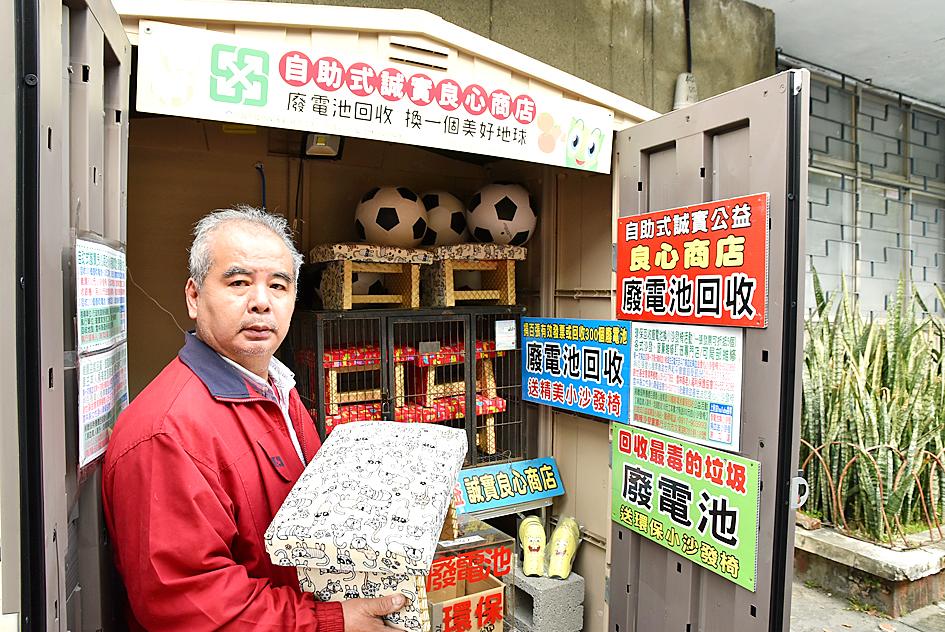An environmentalist in Yunlin County who makes cushioned footstools for people to buy with used batteries has been robbed five times in six months, he said on Tuesday.
Environmental campaigner Hsieh Wen-ta (謝彣達), 58, who runs a 24-hour self-serve kiosk in Yunlin County, said that people have stolen from the stall five times in the six months since it opened, taking more than 50 footstools and prying open the register on several occasions.
Hsieh has been making footstools and curtains for nearly 30 years, and thought that running a 24-hour kiosk would make it easier for people to recycle their batteries and pick up the products in exchange when he was not available, he said.

Photo: Huang Shu-li, Taipei Times
“Even the batteries that had been recycled and the plastic bins for collecting them were stolen,” he said, asking that thieves leave the kiosk alone.
Hsieh began promoting battery recycling 20 years ago over concerns about the damage discarded batteries do to the environment.
To spur recycling, he used the leftover material he had from making sofas and curtains to make footstools that he could give to people in exchange for their used batteries, he said.
His recycling kiosk, which is next to the county’s Environmental Protection Bureau, is the first of its kind in Taiwan, he added.
“It takes more than an hour to make one stool, but these discarded batteries are destructive to the environment — they must be recycled at all cost,” he said.
Hsieh has also worked with a blood bank, allowing people who donate blood to also buy a footstool using their old batteries.
Over the past 30 years he has recycled about 7 million batteries, and given away nearly 30,000 footstools, he said.

The manufacture of the remaining 28 M1A2T Abrams tanks Taiwan purchased from the US has recently been completed, and they are expected to be delivered within the next one to two months, a source said yesterday. The Ministry of National Defense is arranging cargo ships to transport the tanks to Taiwan as soon as possible, said the source, who is familiar with the matter. The estimated arrival time ranges from late this month to early next month, the source said. The 28 Abrams tanks make up the third and final batch of a total of 108 tanks, valued at about NT$40.5 billion

Two Taiwanese prosecutors were questioned by Chinese security personnel at their hotel during a trip to China’s Henan Province this month, the Mainland Affairs Council (MAC) said yesterday. The officers had personal information on the prosecutors, including “when they were assigned to their posts, their work locations and job titles,” MAC Deputy Minister and spokesman Liang Wen-chieh (梁文傑) said. On top of asking about their agencies and positions, the officers also questioned the prosecutors about the Cross-Strait Joint Crime-Fighting and Judicial Mutual Assistance Agreement, a pact that serves as the framework for Taiwan-China cooperation on combating crime and providing judicial assistance, Liang

A group from the Taiwanese Designers in Australia association yesterday represented Taiwan at the Midsumma Pride March in Melbourne. The march, held in the St. Kilda suburb, is the city’s largest LGBTQIA+ parade and the flagship event of the annual Midsumma Festival. It attracted more than 45,000 spectators who supported the 400 groups and 10,000 marchers that participated this year, the association said. Taiwanese Designers said they organized a team to march for Taiwan this year, joining politicians, government agencies, professionals and community organizations in showing support for LGBTQIA+ people and diverse communities. As the first country in Asia to legalize same-sex

MOTIVES QUESTIONED The PLA considers Xi’s policies toward Taiwan to be driven by personal considerations rather than military assessment, the Epoch Times reports Chinese President Xi Jinping’s (習近平) latest purge of the Chinese People’s Liberation Army (PLA) leadership might have been prompted by the military’s opposition to plans of invading Taiwan, the Epoch Times said. The Chinese military opposes waging war against Taiwan by a large consensus, putting it at odds with Xi’s vision, the Falun Gong-affiliated daily said in a report on Thursday, citing anonymous sources with insight into the PLA’s inner workings. The opposition is not the opinion of a few generals, but a widely shared view among the PLA cadre, the Epoch Times cited them as saying. “Chinese forces know full well that